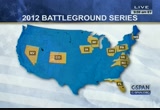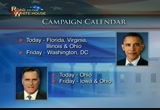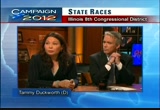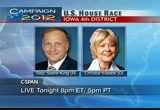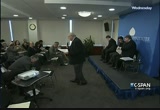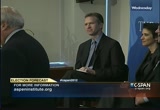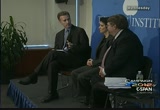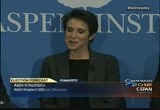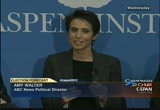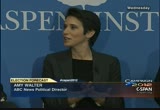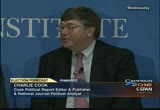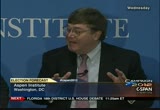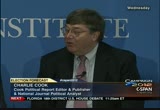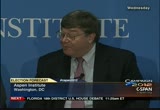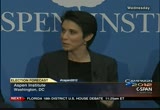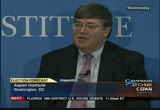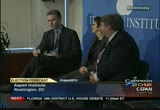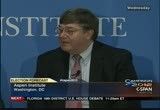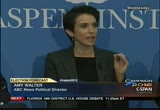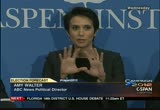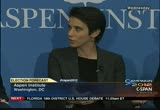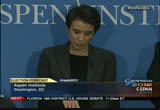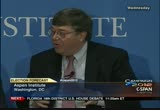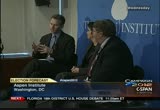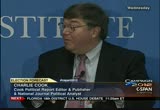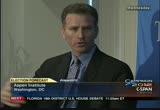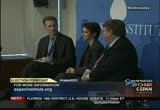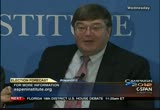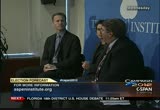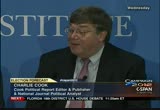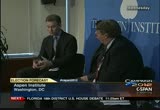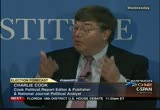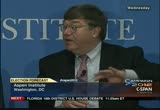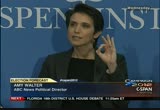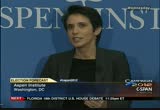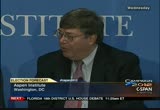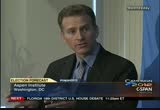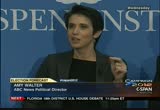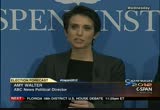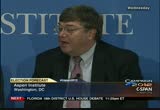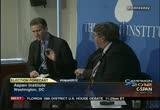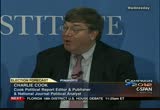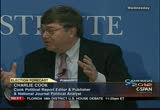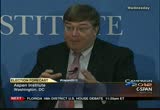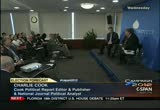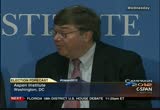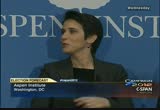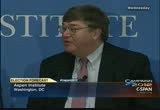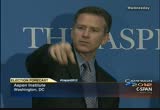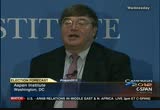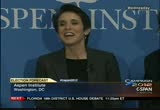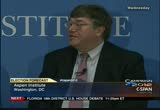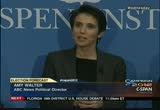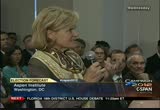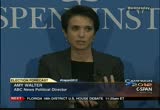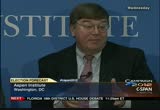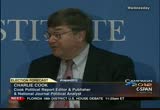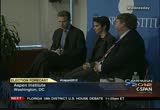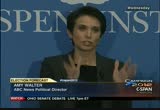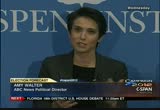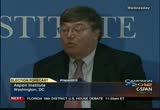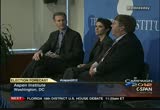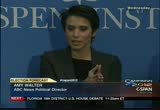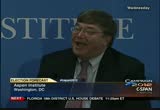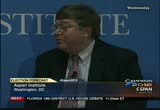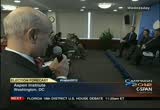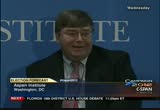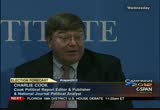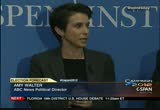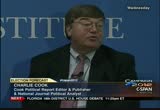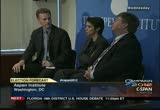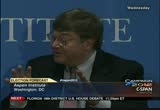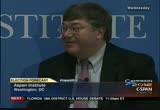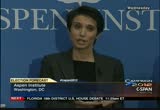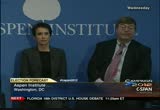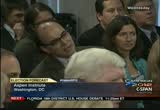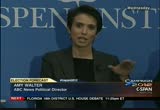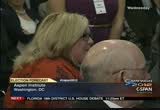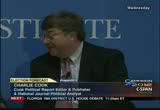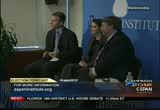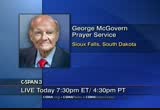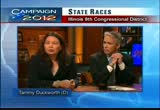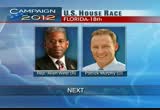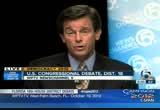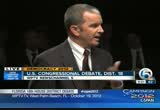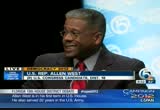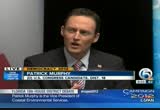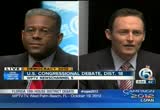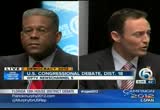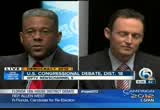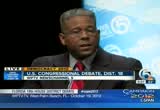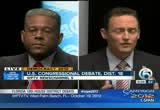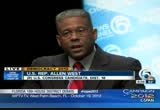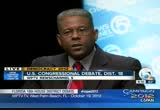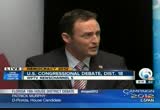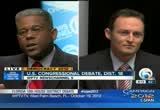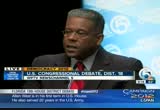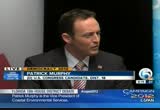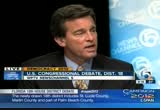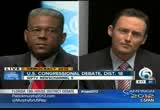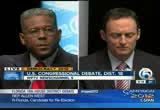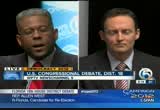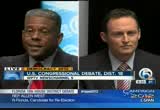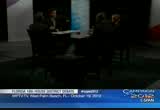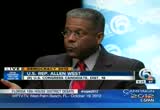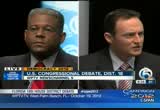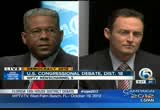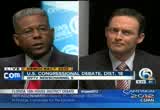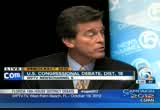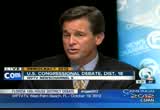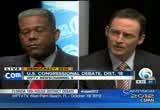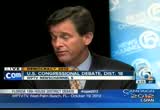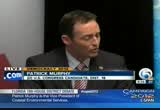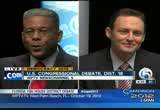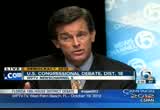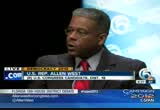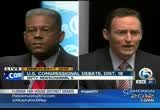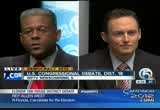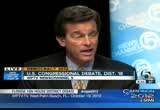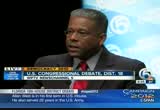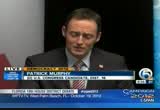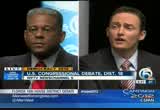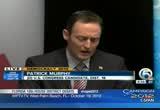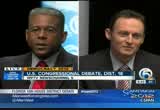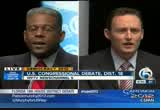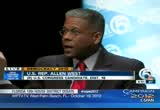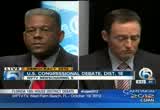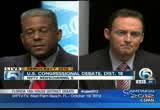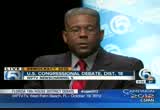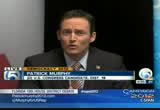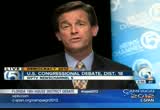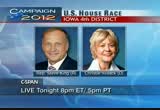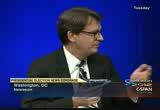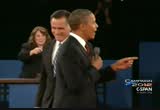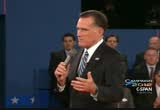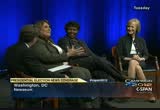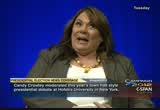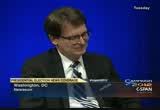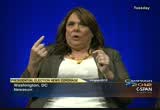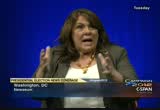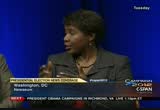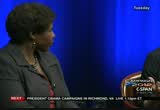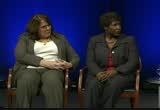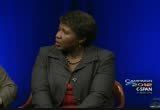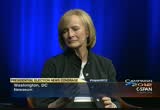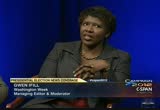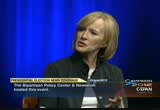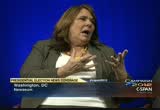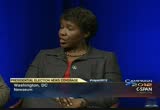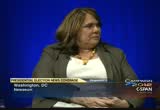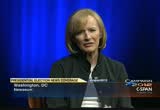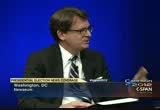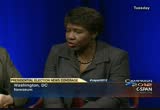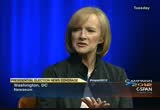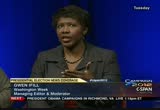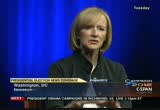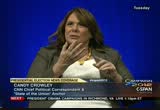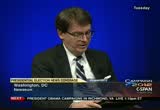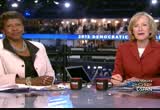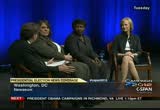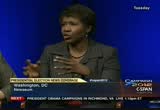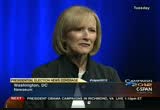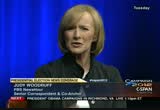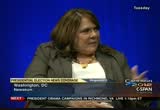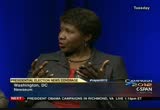tv Public Affairs CSPAN October 25, 2012 10:00am-1:00pm EDT
10:00 am
here tomorrow when we will continue our series with wisconsin. we will see you right back here at 7:00 a.m. [captioning performed by national captioning institute] [captions copyright national cable satellite corp. 2012] >> president obama on day two on his swing through six battleground states. he is started today with a rally in florida. he heads to richmond virginia next. heel be in cleveland for another rally this evening but first a stop in chicago to cast
10:01 am
his ballot. romney campaigning throughout ohio today then he's in worthing on the industries and later the northwestern part of the state. now live at 1:15 eastern we'll bring you president obama in richmond live here on c-span. >> would you support military action in iran? >> if need be, yes. as a last option, yes 6789 >> under what conditions? if sanctions don't work. if they are about to have the ability to develop a nuclear bomb, we use every option possible as would israel and that would be the last option we'd use. >> i think we stand with israel and do not let them develop a
10:02 am
nuclear weapon. >> under what conditions would you recommend it? >> i don't know right now but we better exhaust everything else. and at the end of the day if that is what is needed, i'm still serving. i'll be the first volunteer but we're going to have a darn honest discussion about what is needed. >> with less than two weeks before the election follow the races on c-span in campaign 2012. >> tonight live coverage with several debates when we take you to ohio for the senate debate. at 8:00 the debate for the 4th
10:03 am
district for the house race. at 9:00 eastern new mexico's first district squars off against healther wilson. this time around the two candidates are going for new mexico's senate seat. that's at 9:00 eastern. c-span's campaign 2012 coverage tonight. >> next a round table with charlie cook and abc news amy walter. this is at the aspen institute in washington. it's an hour and twenty minutes. >> ladies and gentlemen, good afternoon.
10:04 am
i am here with the institute's vice president. it is a great honor to have you here and these great folks here. on behalf of the washington ideas roundtable and the michelle smith foundation. we thank you for being here. a lot of us are very interested in the politics for the next couple of weeks. i see old politicians up front. there is the congressmen and ambassador, i know there are others as well. we appreciate folks being here. i recognize gary nell, a friend of minewe have a great program. is here. that soothing, wonderful voice. it livens me. you do a great job.
10:05 am
i will let steve introduce charlie cook and amy walter. charlie's son just came back from afghanistan. last month, he was 82nd airborne. i am sure he is delighted to be back safely and we all are, as well. [applause] steve is the co-host of "morning edition." i will turn it over to steve. thank you very>> is an honor to talk to both of you folks. much. i grew up watching abc news. i pay attention to abc's reporting. it is great to meet amy walter.
10:06 am
she tells them what to do. when i first moved to washington in 1996, very early on i had some political question i was putting to a colleague. they said, you really ought to call up charlie cooke. it is true then and it continues to be true now. for those who don't know, he is the editor of the political report and a columnist for the national journal. i want to begin with a really straightforward question. i am sure the answer is simple. who is winning the presidential election? >> you really had to put it out there.
10:07 am
so, you look at the news coverage and you look at the data and you get two different answers. if you look at the news coverage, especially since the first debate in denver, it would be romney is the guy who has ascended after a terrible summer and a terrible september and what looked like a race that was a runaway obama victory. the momentum is all mitt romney. looking at the polls and national polls, he was ahead. there was a poll right after that first debate in denver. other polls show the race a dead heat. momentum going his way. then you look at the data, especially in the states. we learned that people do not elect the president.
10:08 am
the electoral college elects the president. when you look at those polls, the underneath numbers suggest it is still obama's race right now. fundamentally, he has got an edge in the electoral college, in some of those big states like ohio, wisconsin, nevada, and that his path to victory has been -- he is on multiple paths. whereas romney what is really excited early on that they would fight on the same path rather than trying to expand it. the pennsylvania, michigan, minnesota states they talked about putting in place, they never spent time there. >> i hear you telling me that even if i look at a list of polls, it may show romney plus two, romney plus five, there are obama leading polls as well, but you are telling the obama has the edge. >> structurally, he has an advantage.
10:09 am
if those states happen to flip, they have gotten closer. there is a debate. charlie will have a lot to say about what polls to believe. our polls even trust for the now? everybody seems to have their own poll. i do not know there are actually that many people in ohio. maybe there are professional polltakers in ohio. that may be a good business. there is so much data coming out that you almost to not know what to believe. you have to read what is happening during a campaign. it is clear there is, when you talk about a few of the states, where the obama edge, as slight as it may be, is still there. >> charlie cook, who is winning? >> let me say how much i appreciate. it has been a wonderful experience every time i represent anything with the aspen institute.
10:10 am
i took my son to a conference in aspen. bob gates before he was the director. over there is al. here i am and saying, how did i get here? the aspen institute is wonderful. i got my start working for a senate race in 1972. anyway, thanks. i would look at it. a popular vote, the national polls, it is about even. i want to get into a conversation about polls. i agree about 80 that the electoral college situation looks a little different and it is a little bit more uphill for romney. the way i would describe it is this. president obama was on the verge of putting this race away. it was all but done. you have a lot of voters that were not considering thinking
10:11 am
about considering mitt romney but were not terribly enthusiastic about president obama. suddenly, it pushes romney up into the race. obama drops. in the next two debates that president obama technically one, the feeling that opened the doors for people considering romney in a way they had never considered him fee for. nationally, this is a very close race. it is actually tide. i think there is a lot of scar tissue in the seven swing states that saw the brunt of the aim capital plant closings, layoffs, outsourcing, income tax, cayman islands, switzerland, bermuda, all of that stuff. the romney campaign made a huge error by not going in early on
10:12 am
as soon as they nailed down the nomination and try to tell people about mitt romney. he was a blank piece of paper. instead, one of the things you have got to do is define your candidate before the other side defines them. think of the boy scouts. creating reservoir of goodwill in a teflon coating before the slime hits. the romney campaign opted not to do that. their view was any dollar spent talking about anything other than the economy was a dollar wasted. they basically went into the swing states with a baseball bat and beat on the's trains in. there is still a lot of scar tissue. after that debate, romney went up.
10:13 am
i am sure his numbers went up in all 50 states. there are six or seven as he went up less in because of that scar tissue. so, even if you assume romney takes north carolina and virginia is about even, and florida is about even, it is a tough path for him to get there. iowa, colorado, wisconsin, there is a lot of scar tissue there. that is why it is uphill for romney even though it is incredibly close. >> that raises the question people talk about. is there a legitimate possibility that one candidate wins the popular vote and the other when the electoral vote? >> there is. look at the states that are red.
10:14 am
if you do when florida, north carolina and virginia, even ohio. look at the blue states. this is where the romney campaign says they are doing better. the polls suggest it. they will not lose by the same margins. even like a place like illinois. mccain lost some of these districts by 20 points. that will not happen. you can see those numbers going up, even in states that romney will lose. because some of the states are completely off the map, places like pennsylvania, michigan, that means his pathway has to go through a place like colorado, nevada, or ohio. >> one of the problems is you are on the record. a few months ago, i wrote a column. i was talking all of these people who were spending so much time putting together
10:15 am
combinations of electoral votes like they were trying to solve a rubik's cube. could it happen? of course it could happen. it is unlikely. now i think there is a fair chance of that. if that happens, and romney would be the one who would be more likely to come out of the popular side, and obama in the electoral vote side. that is what we are talking about. all of the republicans who saw a great benefit in the electoral college back in 2000, may be rethinking that. vice versa for liberals. >> one thing i remember about the 2000 campaign is that there was also talk of the possibility of a split between the popular and electoral vote.
10:16 am
the talk was al gore was surely going to lose the popular vote but still had a shot at the electoral vote. it turned out to be the opposite. i am wondering if that is something to remember now. we are talking about this possibility. are the odds still against that really happening? >> yes. >> it is greater than it normally is. if you did not know who the candidates were or anything, i would assume normally that a democrat would be better off in the popular vote because they run up the score in enormously popular states like california, new york. really, the only popular state republicans were up to score is taxes. democrats waste more votes than republicans do. it is that would be the norm if you had a divided electoral votes. this time, it is different.
10:17 am
if that happens, it would be more likely to go the other way because of the last electoral college we are talking about. >> amy talked about pennsylvania being off the map. pennsylvania is put as a swing state. some electoral maps have it that way. >> i would look to follow the money. if a campaign has spent approximately $0 on a state, that says to me they are not invested in that state and considerate of a battleground state. that is what has happened. they talk about that. people on the ground. organizations, that is nice. but nobody has put a dime, from either campaign, recently, in terms of advertising, some of the out side groups put a little bit of money in there, but only a little.
10:18 am
most of this money is going, and the poor people of ohio have been innovative for month. i completely agree with charlie. when you saw these ads going up, going after bain and mitt romney, surely we would get a response ad from the romney campaign. here is what a good guy he is or here is what his business experience is. charlie and i listen to the same focus groups. you hear the swing voters disappointed in president obama but they kept saying i do not know anything about mitt romney. sometimes, they would just say things without being prompted that were from ads. i remember sitting in one group where a woman said, that mitt romney, he is a businessman. we have problems with our economy, but if you shut factories down, in northern virginia, voters were out in
10:19 am
the suburbs, a number of women talking about romney and the economy, but they are worried about the women's healthcare stuff. why is he doing that with abortion? it is penetrating. all we would talk about citizens united, and the influence of money from outside groups, they do not get as much bang for their buck as a campaign does. look at how much spending where we talk about the massive amount of spending going into these groups, the obama campaign has more ads on television and all the republicans combined. number two, all those ads republicans put up were negative, too. they are now putting up positive spots about the boy we heard about who died of cancer, and mitt romney was with him and help him pick up his boy scout uniform.
10:20 am
it is a really touching story. why did we not hear that story before? they did not know about that story until the convention. that is the problem with being an outside group. you do not know your candidate. >> there was an obama at in the last few days that had one of the most brutal attack lies i have seen. mitt romney, not one of us. airing in ohio. that is an alienating line. >> if the republicans ran that, yes. i think you know what the interpretation of it might be. it is an outstanding point. it sounds like that is what you are saying. they would not have gotten away with running an ad like that if mitt romney had done that. it would not resonate. >> what they done this is what they have done is the most effective job. we see the national police.
10:21 am
if you look at a place like ohio, where mitt romney has closed the gap on who you think can do the better job on the economy. he is tied. on who do you think represents middle-class values, a 14-point gap. there are people saying he is good at what he does, he made a lot of money. that is good, i guess. except that, will he make a lot of money and think about me? how am i going to be part of the equation? >> at the same time, coming out of the debates, "the wall street journal" had a survey. they asked to has a plan for the future and to create jobs. while the debt numbers improved somewhat for romney, when you looked at him on the independence, it is 20-points. romney has not closed the sales with these people, but he has
10:22 am
opened up the conversation. a focus group in columbus, ohio, that was fastening work. and one fascinating work. she said, i looked through romney's eyes. that is different from where things were. romney had a horrible summer, a horrible trip to europe, the convention, he got one lousy point out of it. basically until october 1, after winning the nomination, nothing went right. and you had the debate on october 3, and october was a great month. >> amy mentioned something. you talked about the narrative. you referred to the fact that everyone went through the events you described, charlie cook.
10:23 am
the question is, how long will the media stick with that or what will happen. how important a factor is that in the real world, simply the way it political reporters assume it is going and the way they cast their stories as a result? >> in terms of swing voters, i do not think they are hearing it at all. the thing about it is independent voters typically read newspapers less, they watched television news less, they listen to npr less. conservatives and republicans have passions. liberals and democrats have passion. moderates and independents have lives. they are not spending their lunch hour in a room in
10:24 am
washington listening to a discussion or watching it on c-span. they typically do not like politics or politicians, they are very cynical about washington, and they show up for one or two reasons. a civic obligation or they are angry at somebody or a bunch of people. they are not watching fox and they are not watching multiple sclerosis nbc. much of the chatter going on is going past these people. they are not watching rachel and they are not watching john kennedy. independence and moderates. >> it was written the other day about the way the narrative changes. basically, political porter's take a look at the polls.
10:25 am
obama gets out there and says romnesia. if you perceive obama as winning, that is great. if you perceive obama as was in, that is embarrassing. does it color the news they get? >> it does depend. getting the news by watching something on saturday night live, which we use as a great arbiter. a lot of folks who are very passive, and i agree with charlie, you are wonderful people but no one here is normal. we spend how many minutes talking about the possibility of a popular and electoral vote. i would love to pull people around america how much they
10:26 am
have actually thought about that. that show, for many people, does give them an image of that. the image that was created was crafted of mitt romney, both on comedy shows and on traditional media, and by the ads, that mitt romney was staff but also a super rich guy who does not really know what it is like to be an average person. that is what you hear in the focus group, peter asks, what would mitt romney be like as a neighbor. they said things like, i am sure he would be nice and pleasant. i do not think i would be good enough to be invited to his house. i would be embarrassed to bring the casserole over. >> who would they most likely want to have to be invited to a backyard cookout? >> you know who it is.
10:27 am
they would love bill clinton and joe biden to come by. charlie is right on about why this race is not over. the door did open after those debates. there were a lot of people getting a second look at what they see from mitt romney. but the question -- this goes back to the earlier point charlie made about defining yourself -- what are the closing arguments mitt romney is making for them? for many, he is saying things are not getting better, or they are not getting much better but
10:28 am
i do not know if i would give obama much credit. if i were to switch horses, what would i get from mitt romney? they still have not answered that question. >> one of the things we have talked about is which mitt romney? the guy who came by our office running for the u.s. senate in 1994 was really bright, an analytical mind. he was more of the problem solver. he was a management consultant. he thought he could do a better job. he was fairly non-ideological. if i had to put him on a scale of a football field, i would put among the 35 or 40 yard line on the right side, but nowhere near the reds on. that was the guy then. that was the guy who started to run for president in 2007. somewhere during the 2008 campaign, he realized it was not working and he had to go hard right. for the last four years, he has been running as far to the right as he possibly could. when you had that fox news debate back in september of
10:29 am
last year when he said, if you were offered a budget deal, 10-1,, would you go? not one of the eight republican candidates raised their hands. the thing about it is, that is one hell of a deal. he really did not hit us back until -- not even at the convention. it was the first debate. it was a different romney. people have to sort out for themselves which is it. this is closer to 1.0. that mitt romney could win a general election but could not win a nomination. the other mitt romney could win a nomination, although it was a struggle, but could not possibly win an election. >> you describe mitt romney doing a lot of things that you, looking at it professionally,
10:30 am
to not think it is necessarily ideal behavior. having a terrible summer, a terrible september, the 47%. after all that, the president, with all the advantages, was only up four points. had one bad night. what does that say about the president? >> go back six months ago and you look at the economy, and say, recumbent presidents do not get reelected with the economies like this. the fact that romney was behind with a lousy economy was really quite remarkable. i think you also had, starting in august and september, a time where the stock market is near a five-year high. consumer confidence started shooting up. housing market finally starting to shine some light. consumer confidence jumped up.
10:31 am
we started seeing in the polls right direction moving up and long track moving down. the economy would lean toward an obama win. it was less of a liability. 47%, you could look at the polls and see what day that happened. a lot of looking through the data. it said it was non-college educated white women that took a huge dip after that 47% remarked. that was a group that was holding out. they are a problem for the president. non-college educated white men
10:32 am
is a no-fly zone for the president. the women did not really like obama, but they were not comfortable with romney. the 47% really hurt. after the debate -- >> the president have these advantages in the campaign, and serious. >> two things i think are working against him. the economy. the other is -- this is especially true from the suburban women here in virginia, columbus, ohio -- if he was going to change washington, that people voted for this guy, i remember talking to people out in the exurbs of virginia who said, i do not know, i cannot believe i voted for a democrat. but i really believe he is going to change the way this is. not completely.
10:33 am
it is the frustration that he said he was going to go and make things better and it is 100 times worse. congress is much more polarized. maybe the economy is improving. things are getting a little better. why are the next four years going to be any different than the previous four years? how are you going to work with the congress you seem to have completely dismissed? the question was asked, if obama is reelected, what percentage of you want to see major changes, minor changes, or no change at all during the next four years? 62% said major changes. this is a group of people out there, take away the partisans on either side, who very reluctantly will pick the next leader of the free world. this is not out of passion or thinking things will change. it is the least bad option.
10:34 am
>> the thing that disappointed me the most, all three of us have unusual vantage points watching so closely here, but watching the president's acceptance speech, the debates, i kept waiting to hear him say, i have some regrets about how i handled things. if reelected, i would like to do some things differently. this president has virtually no relationship with congress. when political ran a piece back in may that pointed out the president had not at a single conversation in person or on the phone with the chairman, not a single -- >> would george w. bush be different?
10:35 am
or ronald reagan? >> i had heard the chairman say he had been to the family quarters under both bushes. go all around the hill and asked members of congress how often you have any kind of interaction at all with the president. you would find it is shockingly small. ronald reagan came to town. he did not know a soul when he got to washington. he had the personal skills and the desire to build relationships. >> you mentioned waiting for the president to say, i made some mistakes.
10:36 am
in the first debate, he said something about how he is not a perfect president. >> right. >> he did not finish the statement. >> what they want to hear is not so much, i really messed up on the economy. it is, i came to washington and i wanted change. i thought i could do this. it is really hard. i need to do a better job of it. i think people are willing to listen to that. he also has to believe that and say that to the people on the hill, both on the republican and democratic side. things are going to change because they have to. we cannot go through another four years of a paralyzed washington. that is what, for all the people in denver and virginia listened to, when the economy
10:37 am
is better, they are not giving the president much credit because they think he failed on that measure. >> a quick related question, if people are reluctant to embrace the president for a second term because of gridlock in washington, are they also reluctant to embrace their incumbent senators and representatives at this moment? >> no, that has not translated. the whole system is broken. they do not like democrats, they do not like republicans, they think the system is broken. the great irony is in 2006, democrats got in control of the house in large part because they defeated a bunch of moderate republicans. republicans gained control in 2010 by knocking out almost all of the moderate democrats. voters did believe they were making change.
10:38 am
they want to throw these bums out. in their desire to create a message of change, they created a more polarized place. i also get frustrated when you have the campaign committee chair people of each side saying congress is so terrible. it is because you beat all the people you could have worked with. you targeted them and painted them with a broad brush, this is just another bush republican or an obama democrat. >> there is no silver bullet. if i could wave a magic wand and do two things -- redistricting reform so we do not do all these customized districts for republicans and democrats. when you do that, you get far-left democratic districts and far-right republican districts.
10:39 am
open up primaries -- california did that. we see more competition in california than in the previous three decades combined, just in one year. it may not be the perfect reform, but i tell you what, you are getting competition. you have members who have never tried to talk to voters on the other side or independents. you have sherman and berman, they are running to try to reach republicans and independent voters. two democratic incumbents facing off against each other. you see interesting things happening. that would do more to fix washington than any things i can think of. >> other things -- i will throw it open to your questions. i believe there will be a microphone passed around. first, both of you have
10:40 am
referred to polls./ when you refer to what polls are saying, is that before or after? >> you go. >> i have very strong opinions. >> should i explain this for the audience? we're talking relegation that some polls skewed, were showing obama and had when they were not, some are adjusting the polls. they refer to a choose your own adventure campaign -- you can decide who is ahead and behind, you can have your own debate winner. yesterday i saw a video where you could even rearrange the debate to have the argument go the way you wish. >> they have a subsidiary research were you could go online with a credit card and give them your credit card, write a question, and it will be asked in a robopoll next
10:41 am
night. i am not sure why i decided to bring that up. anyway, here is the common sense -- cherry picking. people who think they go for the one poll that tells them what they want to hear. that is the most accurate -- any other poll is obviously methodologically flawed. the cherry picking is there. the other one is the worst -- the latest poll must be the truth. even if it is inconsistent with 10 other service, they seize on the latest. the third, and the way to combat that is to go with aggregation, where the average a bunch of calls together. the problem is that half the polls and into the average are -- what is my acronym, computerized response attitudinal polls, with their
10:42 am
internet or robopolls. they cannot call cell phones. some states, close to 50% of respondents. you have a huge methodological problems. if your average it -- averaging in garbage with the good stuff. what we do on our website is a go completely for the presidential -- national polls and battleground states, say, we will just show polls that are live people calling real people with methodology, putting that in. for conservatives who do not want to trust the liberal media, ok, fine. just do this -- watch the fox poll. to be perfectly honest, there polling not look different from other networks. look at fox and "the wall street journal."
10:43 am
one of the two pollsters, he was one of romney's pollsters for years ago. they are probably not in on the conspiracy. so just look at those if you do not want to look at others. they look like most of the other reputable national polls, live people with live people. the days of the largest newspaper in the state commissioning a firm to do a legitimate poll -- that does not happen. one of these firms, it was a firm in north carolina that puts out over 800 polls a year. >> 800 polls a year. >> that seems like a lot. >> yes.
10:44 am
and the other big firm has five or 10 people. >> it would be funny to do not just an autopsy of the public polls, internally you hear different things, too. we get to hear or see about -- the campaigns tell us, we have this here, this there. assumptions about the campaigns, at the presidential level, the senate level, about what the electorate will look like also color the way they are looking at each of the states. if you put truth serum into both of the campaigns, they are not going to be that far off. >> ohio. it came to mind. >> democratic pollsters, has obama by six or seven, one by five.
10:45 am
republican pollsters, one has obama at 1, one at 46, and one has it even. somewhere between even and 7. probably split the difference. so by looking at the shoe leather, like amy does, like some of us do, talking to people on both sides, you can get a feel for where this thing probably is based on high-quality research. >> would you recommend that people look at these state polls over the national polls? >> no. because 90% of them are robo or internet. >> the quality is not their? >> others -- the abc "wall street journal" poll is quality.
10:46 am
there are some high-quality live people calling live people, but it is very little. that is what pollutes the averages. whether it is pollster.com or real clear politics or talking points memo or nate -- he is a really bright guy, but you have tv more discriminating in terms of what you are plugging into this. otherwise it is garbage in, garbage out. >> given we are in a choose your own adventure environment, tell me -- is a very close election, presume it remains a close election. do you think the public at large is going to be prepared to accept losing? >> no. >> it will feel very different than 2008. mccain voters wanted a guy to
10:47 am
win, but he talked to a lot of them they would say, on that election night you felt america just made history. there was a hopeful moments. you saw hopeful numbers spike up after the inaugural. and then of course it crashed back down to earth. that was completely wiped off. the real question is will it feel like 2004 with the frustration and hand-wringing, we do not believe this, or will it be like 2000 where you get this position of this race was stolen. this is an illegitimate president. that will come down to, are we going to have another hanging chad. >> in 2004, as close as that was, i had a bunch of lefties mailing me, the election was stolen. you will have deniers.
10:48 am
in any close race there will be deniers who are not willing to accept losing. that is part of where society is. it is what it is. >> you are talking about perhaps something larger? >> even 2004, which was a close race but cut and dry, there were people who said ohio was stolen from kerry. >> but we are even more polarized. so the intensity is more. >> let me invite your questions. if you would stand up so people could see you and say your name and where it you are from so we learned little about you. i will start with the back row. go ahead, sir.
10:49 am
>> will davis with united nation. the whole reason i listened to morning edition can be summarized by these fantastic stories -- it puts a spring in my step the whole day. the senate -- could it be very close? who will control it? which races will it come down to? >> charlie, you go first. >> if you were a republican, we said a year-and-a-half ago republicans had a 57% chance of picking up the majority in the senate. control -- that is a number that begins with a 6 and usually does not end with a 0.
10:50 am
whether it was olympia snowes retirement, todd akin being a biology instructor. that race is still close, though. some republicans who i thought were first-rate candidates are not doing as well, in hawaii and new mexico. i think there is a 47% chance of republicans taking a majority, but there will be a lot of one and two-point races. i would not be surprised if wednesday lunchtime, we may not be positive. six years ago, the last time senate seats were up, you had missouri, montana, virginia still up for grabs. that was the majority of the senate. those three states, our senate editor figured this out -- 4.3 million people voted. those three states were decided by 60,600 total votes.
10:51 am
we could be in that type of situation. basically, once you have the nelson open seat -- that is a done deal. two if they win the white house, three if they do not -- if nebraska is moved over. you have five democratic tossups, five republican tossups. that last group of tossups states do not split down the middle. they have a tendency to break two-thirds one way or the other -- it is like dominoes. the one-point race -- that is the last best of wind, then they typically break one way or the other. democrats have an advantage, but i would say there is a 40% chance republicans get it. >> if you want to know who has control of the -- majority of the senate, virginia certainly is a place to go.
10:52 am
if republicans win in a virginia, i would argue there is a very good chance they get the senate. even if they lose massachusetts and maine. they are winning in states where it was really close but maybe romney came over the top. then they win in north dakota, montana, nebraska, maybe they pick up, i do not know what to think about wisconsin, but that is another one. >> people often say that about wisconsin. >> the guy from indiana. >> people do not think about indiana -- i do. >> that really, to me, is the state that will tell us the most. >> is this the theme of the senate races this year? people in very close races in a really nasty states, wether is
10:53 am
scott brown in massachusetts, heitkamp in north dakota, donnelly in indiana -- you could have an olympic gold medal winning swimmer, but how bad can the undertow get before they get sucked under? take massachusetts, where brown has to basically win 100% of the republican vote and 100% of the independent vote and one out of five democrats. when every romney voter plus 200,000 obama supporters have to split their tickets. >> if all the people won, the senate would look different. they are opposite parties in states that do not traditionally elect somebody from their party. they would have to be those down the middle, need to compromise kind of people. it would suggest that
10:54 am
massachusetts -- that is a great case study -- scott brown loses, will lose with very positive people. akin will not lose because he did a terrible job -- they will say they do not like the idea of republicans having control of the senate. >> if we had parliamentary system a party could pick somebody up and put them someplace where they could actually win -- you have an extraordinarily good candidate in an ugly place. >> let's go -- in the second row? >> i worked on the hill and at was at the task force at d.o.d. a couple things -- what is going on with voter protection, and how much of a difference do you think -- they were horrible horror stories, people dumping ballot boxes in the river, so what is the sense of that?
10:55 am
my second question -- you mentioned that people have to sort through who romney is. important questions for those of us who live here -- is romney going to control the tea party or is the tea party going to control romney? sorting that is difficult for us inside the beltway, but outside the beltway one would hope the obama campaign had made that particular point, particularly in intellectual states like massachusetts -- are they doing that out there? i saw elizabeth warren and scott brown go back and forth in the debate, talking about control the senate and what that meant. if the obama administration -- we do not have access to advertisements like you can see across the country. are they doing something to define it that way out there? the president really does need some control over the tea party. >> the first question, protection, was that like?
10:56 am
>> every year there are problems in every single state with voting. those of you who go to voting places no primarily what those problems involved. they are nice, sometimes elderly, most often out of the people whose task is to help people get to the voting place. sometimes, there was a year in montgomery county -- nobody taught them how to turn on the machines. people showed up and the machines were not turned on. there was no conspiracy to deny people the right to vote. this was a fact that a lot of nice people had no idea how to work the machine. that is 99% of what goes on. every year we put people, we task them to the ballot watch -- watch out what is happening. report any problems anywhere. every year somebody runs out of ballots in some county or jurisdiction.
10:57 am
every year there are debates in big cities about whether the polls should be open later because the lines are too long. at the same time, the following things will happen -- there will be mistakes made, votes miscounted, things that, they found absentee ballots on the bottom of this room they forgot to check. that is going happen. i will tell you that it is 99.99% about honest to goodness mistakes and not malice. >> i could not agree more that what you have got most counties spend more money on food in the county jail then on administering elections. so we get all the accuracy that we pay for. you want precision? we will have to spend a whole lot more. we basically have a system that
10:58 am
is based on a oftentimes elderly workers using new technology. think about it. surely -- there will be the acorn people on one side, the crowd in virginia -- there will be samples of that. but there is not a serious voter fraud problem in this country. the bush administration in eight years, they found fewer than one for all 50 states. that is negligible. it is people who want to deny, who would not accept that they lose elections. believe what you want to believe, but in the scheme of problems in this country, this is way down the list as far as i'm concerned.
10:59 am
>> voter fraud -- way down the list. voter suppression, which is what democrats are talking about -- would you put that down the list? >> i think running ads to try to depress the supporters for the other side is something that virtually every competent campaign in both parties in competitive races do. you want to get your people out and you want to give your opponent supporters conflicting emotions so that they may be stay at home. >> that is conventional voter suppression, not some mechanical thing changing the rules, voter i.d. -- >> pretty darn rare. >> so the vote stealing that is concerning to partisans would be overwhelmed by the normal human errors of the election.
11:00 am
institute. both of your expert election watchers -- i am wondering if you talk about super pac's, the impact they have on the election? >> i cannot wait for the real autopsy when all is said and done about this. i said a little earlier -- the amount of money spent, especially on the republican side, has been astronomical. it is the main reason why mitt romney is not getting outspent battleground states. at the same time, flooding money is not always particularly helpful. first of all, no matter how smart these groups are, and believe me they are a heck of a lot smarter than outside groups
11:01 am
you see, which used to be much more ideological. they had a cause, and it would spend a lot of thought -- money, even if it was some stupid thing -- they have to have more jello in schools. now they know -- they have their own media shops. this is how we move voters to our candidate. we have to help mitt romney even though we cannot coordinate with mitt romney. their focus is oftentimes completely different than what the campaign wanted to be. you have conflicting messages, which is not always helpful. the most important thing is that they have to spend more money to get an ad on tv. the unit rate -- if you are a candidate, a tv station has to give it to you. you get a lower cost. you have in some places -- there is a rather complicated thing about if you buy early and reserve.
11:02 am
buying ad time is not much different than anything else -- you want to look for bargains and be strategic. when they go into buy ads, they as much as the campaign. >> they spend retail while the campaign pays wholesale. >> a much better way of saying that. >> they have made an impact, but at the end of the day they did not to the one thing we both agree could have helped mitt romney at least early on, which was the finding came as opposed to letting him be defined. lots out there said that president obama is a terrible candidate and steward of the economy -- people already knew that. they did not know who mitt romney was. finally, the senate is another big piece. after all is said and done, if all these republican super pac's who said -- they said it would buy this election. if mitt romney does not win and
11:03 am
republicans and not take control of the senate, that is not a good return on investment. i would be curious to see what the reaction is going to be like from the circles. >> it is not new for very wealthy people to have through spending disproportionate influence. whether you want to go back to 1972 or way before that, soros and peter lewis, it happens -- won election they will be on one side, another election the other. do i wish the supreme court had not decided that campaign spending is a form of speech? sure. but the super pac's were a logical extension of that decision -- it is what it is. i do not think there is a lot we
11:04 am
can do about it. but i do think is right -- if money was determinative, a lot of different people would be in elected office now. i think the most concrete thing at this time is that it extended the republican nomination fight. the super pac's for santorum, for gingrich, kept him going. even romney during a few patches, financially, he got through with financing. that race would have been over a lot sooner had it not been for super pac's. >> a follow-up question -- the romney campaign had a mistake in not spending money to explain to people who he was. surely at some point you have asked people from the romney campaign about this. what explanation had been offered? >> we want to be focused, we want to be disciplined, we tested it and it did not move
11:05 am
the meter. >> this is about the economy? this is an election fundamentally about the economy, a referendum on the president. we will get out spent two or three or 4 21 regardless of what ad we put out there. the challenger, do not get to go when. we had to fight off the six other people in the primaries from president obama could roll together all his cash and dump it. this is the gamble both sides made -- the obama campaign gambled that defining romney early would define the race. if they lose, obviously the gamble did not pay off. romney needed to get through the primary, but also that this was a race about the fundamentals.
11:06 am
the fundamental is that one guy is president of the united states and a time of incredible economic despair. >> they have viewed this will be a referendum on president obama and the economy -- i think it is more complicated. it is people who are asked, do you want to renew this president's contract for another four years? yes, no, or maybe? >> if the no combines to 54% or more -- do you feel comfortable replacing the president with mitt romney? they view this first part of the equation as important -- >> and not determined that part. >> not the second. my view was that thought the american people would know the economy sucked without any help from the romney campaign. [laughter] they wanted to stay focused and disciplined.
11:07 am
that leads it to, why today super pac's not come in. >> they said, that is not our job. >> restore our future, a pro- romney super pac, had a nice testimonial spot that i thought was really good, but they only ran for a while and stopped running it may 27. >> it popped back up. >> did what you say explain romney's performance in the foreign policy debate, where he seemed restrained and adjusting his position -- is that the campaign, they do not want romney to get in the way of the message, which is the economy? >> that was a lower risk. i think it worked fine for him. the thing is, i do not think he
11:08 am
was going to win a foreign policy debate. area of expertise. i think he opted to go a low- risk strategy. >> the gentleman in the bow tie, in the front row? >> i am on the board of the institute. i want to pick up on an earlier question about romney's shift to the center. i am not an undecided voter. if i were and if i really believed that romney would be willing to take on the right wing of his own party to arrive at pragmatic compromises with centrist democrats, that would have a big effect on my vote -- i sense he would sort of like to do that, but my other hunch is that he will not be able to get grover norquist off his back so easily.
11:09 am
i would be very interested in your sense of who is the real mitt romney and if it is what i hope it might be, why he does not say so more directly? >> i would argue, first of all, you could make the same statement of president obama. i think there are a lot of ideologues who believe compromise is a four-letter word in both parties. i would say it is over half of the members in each party of congress qualifying in that. the other question earlier about the tea party, less than a third of the freshman joined the tea party, less than a third. given the choice, less than a third -- 19, is that right? 19 freshmen. john boehner in the tea party? maybe the wine party. [laughter]
11:10 am
i do not consider eric cantor or boehner tea party. the thing is, you are taking an old line, conservative republicans, and putting a new label on it called the tea party. the movement -- i do not think it exists anymore. we have had conservative republicans for a really long time. find me a tea party voter that voted for obama -- no way. or they voted for john kerry or al gore -- there are not any. i think we will -- would a president romney be able to stand up to the more conservative elements in hisgood question. would president obama stand up on entitlement changes and
11:11 am
domestic spending? i think we are looking at two sides of the same coin. they are both problematic. >> the voters get the joke -- that is the problem. we keep coming back to who will be able to do that work. to your point about him talking to the center, this is the mitt romney that the obama campaign did not want to face. they did not want to make this about the flip flopping mitt romney -- a lot of people would say, that is not that bad, not that conservative. they need him to the extreme mitt romney, the severely conservative mitt romney, which is why these ads, when you look at the most over the top negative ads coming from barack obama, not mitt romney. most of us are in the media market -- you see the women saying i will not get contraceptives and will get cancer and die because of mitt romney, because he will cut off
11:12 am
planned parenthood. they want to make the extreme argument, which is why you saw him at the debate the other day -- it is not his territory, and he could get himself tripped up in the debate, but also those very women he is trying to talk to, he does not want to be a george bush, put into a category of a george bush neocon or beating the war drum. he distances himself from almost all of that -- one of the first things he said in the debate is we do not much to see another iraq. >> it raises a larger question -- mitt romney 1.0 could not have possibly won the republican nomination. if you are a democrat -- talk about 2016 for a second. a lot of people in this room
11:13 am
think mark warner is pretty good. his chances of winning the democratic nomination are zero. it is the same thing. these parties have gotten so ideological that you cannot -- that was what was so remarkable, i think, about the obama-clinton race -- it was not a race to the left. it was generational and socio- economic. it was a lot of things. it was not about ideology. i think that sort of -- the specifics of that race masked a larger thing -- the democrats have the same problem. >> let me ask another question -- regardless of whether you believe as a politician that you will have to govern as you campaign -- if you buy that notion, how do each of these guys have to govern, given the way they have campaigned? >> given the fact they have a demagogued on issues to have to
11:14 am
deal with in the immediate future -- entitlement and taxes. ohiotheir hands are forced already, we have the fiscal cliff coming up and the reality of sequestration. or the other. the question is, how ugly does it get? there was a whole piece today in the "des moines register," they had an interview with the president that was off the record and now is on their website. it will be pretty ugly. happen. >> republicans the other day had a conference call. apparently they were asked, i do not know if it was boehner or cantor, do not commit anything, do not commit, say as
11:15 am
little as you possibly can on this because things are going to have to happen after this election. i think, hopefully after the election, the adults takeover on both sides. obviously things have to happen december 31. >> those conversations are happening. folks i talked to on both sides seem committed to the fact that leadership is going to be -- at least right now they are talking in a way that suggests that they do not want to see another debt ceiling meltdown. >> the senate side, it is plausible that some kind of a compromise is worked out. the house is very problematic. you have a lot of really exotic members on the right and the [laughter] >> not that there is anything
11:16 am
wrong with that. >> they are hard to get those people to the same table. >> we have time for two or three more questions -- you, sir, in the second row? >> walt lawrence. we have had a lot of detailed analysis of the debates and the impact they might have had on the election, but if i had it right there were four debates. any analysis or views about what the vice presidential debate did? >> i think the vice- presidential debate gave a boost to a very depressed democratic party. they came out of that first one wringing their hands, this is over, this is a disaster, the head swinging, i cannot believe it -- but it did not have an impact on the actual numbers, in part because voters are still picking the president. mate. it was a good morale boost for a democratic party that needed
11:17 am
one, but beyond that i do not think it had much of an impact. >> there should be a disclaimer -- this debate is for entertainment purposes only. [laughter] it has no impact whatsoever on the outcome of the election. amy is right. you had the president's performance the first time -- jay leno's line, the only people who thought the president won the first they were the nfl replacement referees. [laughter] biden got him off the ledge. he got him back into the room and into safety. republicans were obviously worried about medicare or social security -- that could blow up. it did not. i think both sides were very relieved with how the vice- presidential debate went. >> one or two more questions -- the gentleman in the back, with the glasses?
11:18 am
>> i am an independent consultant. i have kind of a long question, but i will make it short. going back to the debates in general, substance versus style versus the shaping by the media, i talked to people and i have heard even on interviews that people heard obama's retort, specifics, versus governor romney's question -- that is one. the other, the issue of term limits -- would it not be better to have a six-year president and one short campaign? >> jimmy carter had that idea. how did that work out for him? [laughter] your other question about who was more specific in the debates -- >> if you ask democrats, they will say obama was more
11:19 am
specific, if you ask republicans, they will say romney. independents probably did not debate. >> we would just have a longer campaign season -- there is no way we would not spend more money on it. the vacuum will be filled. theharlie's point, beyond partisans who say that there guy won, it is difficult to go through and read the transcript of the debate and then watch it. it is a very different debate. it is like the nixon thing -- if you listened to on the radio you thought nixon won, if you watched it on tv you thought kennedy won. style does matter. for the vast majority who tuned in for even five seconds, what they saw was a president who did not seem like he wanted to be there. for a president who was already teetering on the question of
11:20 am
back? they sure did not make him feel like they were wrong to change their mind. style is important. that is why they spend almost as much time learning about what kind of face they have. >> or going on a tour of hoover dam. >> explain that. >> he skipped one of this debate prep sessions to go to the hoover dam on the first one. >> who doesn't want to see the hoover dam? >> it has been there for a while. [laughter] >> one more question -- go ahead. the microphone is coming. >> you two are as involved as anyone i know -- what will be the big surprise when we wake up the day after the election?
11:21 am
>> that it is not over. [laughter] up? there is that -- look, there is always something you do not expect. but these days if there is a surprise is something that literally broke the day before. if they -- are we thinking about the presidential, the senate race? >> we are always chasing after -- to hear this, this, you are trying to figure out if there is anything to it. after every shocking upset, i conversation i had with someone
11:22 am
somewhere who suggested -- >> they always say it off hand. 67 others -- they say you better watch that one and nothing happens. >> let's say there is a democratic senate majority super pac -- they went up on the air in pennsylvania for bob casey. not a race we have considered competitive. a lot of polls show he is up, but most of them were polls of dubious credibility. do you believe it or not? we will spend today trying to chase down and figure out whether the pennsylvania senate race is competitive or not. we are chasing these things all the time. who knows which one ends up being the one? >> maybe that is a good point to stop this. thank you very much.
11:23 am
>> mitt romney focusing today on ohio with a parent cs -- with appearances. the president is arriving for an early-morning rally in florida, and now he is headed to richmond, virginia, at 1:15 on c-span. at c-span2, investors are part of the annual policy makers conference, like eastern at 3:00 c-span2. and then a prayer service for a former democratic senator george
11:24 am
mcgovern. he pass away sunday at the age of 90. vice president biden will be at the prayer service today. tomorrow, live coverage of the funeral service at 2:00 p.m. eastern. you will also be able to hear that on c-span3. >> would you support military action in iran? >> if need be, yes, as a last option, yes. >>, under what conditions? >> if sanctions do not work, if they are close to and about to have the ability to develop a nuclear bomb, we use every option possible, as will israel, and that would be that last option we would have to use. >> i think we stand with israel and we do not let iran develop a nuclear weapon. >> under what conditions would
11:25 am
you recommend it? >> i cannot tell you, but we better exhaust everything else. if that is what is needed, i am still serving, i do not know what they need with a new tenet -- we will have an honest discussion about what will be needed. >> follow keep racist on c- span, c-span2, c-span radio,-c- span.org. >> live debate coverage. next, and looked at a house debate and florida's 18th district. this is between allen request and patrick murphy. this is courtesy of wptv in west
11:26 am
palm beach. >> tonight this is a newschannel 5 special presentation. >> good evening, and welcome to the debate between our candid its tonight. they are democrat patrick murphy and republican alan west. thank you for joining us. i will be the moderator. as part of our coverage. joining me to ask questions, are two of my colleagues. our format is simple. each will be asked a question and they will have one minute to
11:27 am
respond. then a 30-second rebuttal. at the end of the broadcast, they will each have one minute to make closing statements. we will try to get through a lot of topics. the first question will go to mr. west and will come from george. >> your opponent has based a lot of his campaign on the controversial things you say. you have called members of the congressional progressive caucus, nests. you have said joseph goebbels would be proud of the democratic talking points. i think that was on the budget last year. you told a conservative women's group that they should stand up against liberal groups that were in your words neutering american men. your critics say that makes you a polarizing and divisive figure. it might be great for a cable tv, but makes you ineffective.
11:28 am
how do you respond? >> look at my legislative agenda. i did not see any people from my campaign standing out hurling epithets at patrick murphy. we can see a lot from the ads they will rot. i have to tell you, we have to have the discussion about ideology in this country. when we talk about progressivism, it is very easy to talk about communism cannot marxism, socialism, because the principles of governance is what is separating this country. with regard to the, about goebbels, somebody asked a simple question, how do you feel about the majority of americans believe that the only people on capitol hill are republicans? there is a propaganda machine out there operating that goebbels could be proud of. i thought we lived in america where there was freedom of
11:29 am
expression, and i will not be afraid of people because they get upset. >> keep an eye on the lights there. >> thank you again for being here this evening. it is an honor to be here. the reason i got into this, the extremism of the tea party. that is no way to move the country. whether it is your family, business, we have to be able to work across the aisle and do the best for americans, the district, and when you are spending your time comparing your opponents to communists, that is no way things to them. -- that is not a big way to do things. there's no way we will be able to reach across the aisle and be able to work with each other. when i meet people, that is what i want to hear, what are you going to do with my medic
11:30 am
are/ >> jonathan, you would director question -- >> talk about bipartisanship, one of the things my opponent has done to a liberal organization, he says he will not join the blue dog coalition. obviously you are not willing to work within your own caucus. talk to dennis kucinich about he came to me about working on libya because the president violated the war powers act. or when i worked about that congressional gold medal for marines. my legislative record shows plenty of bipartisanship. >> thank you. >> those are the examples you always point to. when you only have two examples, is a problem.
11:31 am
i am a new democrat, a business democrat, fiscally irresponsible and socially acceptable. at the end of the day, i used to be republican. i'm focused on doing what is best for america, not focused on whether republicans come democrats -- republicans, democrats, independents think. >> given the tone the race has taken, can you look across the table and say your opponent is unfit to be a member of congress? >> we have different views as part of what makes the congress so great is it is the people's house. voters are not happy with the representation, they can vote to people out. at the end of the day it is up to the voters. i got into this race because i keep our country is at a tipping point. we face serious challenges, and we need people who are serious about getting our country back
11:32 am
on track. i will focus on protecting that middle class, protecting the promise to our seniors. >> when you talk about the fundamental principles of you want to call it extremism, but we talk about limited government. that comes from the declaration. talk about fiscal responsibility. moore party has taken us to over $16 trillion debt. we talk about freedoms and sovereignty. when you look at what has proposed coming out of the democratic party to raise taxes, that only yields you $85 billion in new revenue. it is not sustain the government for more than 21 days. that is the thank you have signed on with. but we are talking about is stabilizing tax rates. but are not talking about the capital gains tax. death taxes -- i have been
11:33 am
talking to farmers. that will kill our industry. i have been talking to people as well, but you did not go to the north palm beach county chamber of commerce. >> we will announce a way into jobs. let's talk about the improving trends in florida. , and employment in palm beach county, to 9.2%. an improving trend. st. lucie county, 13.6% to 11.7%. democrats argue across florida and the nation, the trend line is headed in the right direction and that is a powerful case for continuing democratic policies. your response? >> i think when you look at the governors in the states where you have seen unemployment decreasing, these are republican
11:34 am
governors. they are putting in job-grading policies. if you look at the computation, a lot of the -- under employed and had completely dropped off .7%.rolls, that is 14 sev when you drive up the highway, you see too many close to four fronts. business owners are concerned about too many things. onerous tax policies, lack of access to capital. >> we have to look at where we were four years ago. we were bleeding over 800,000 jobs and month. the dow was cut in half. the housing market had just fallen. it's things are slowly coming
11:35 am
around. people are upset in this district because we have not come out of this recession quicker. we are on the path to recovery. we have had over 31 straight months of job growth. the stock market has almost doubled. we got to continue down this path and not go to the failed policies of the bush administration's that got into this in the first place. >> both of you have talking points for either party. what is the biggest proposal you have congress or with local businesses to create jobs in our congressional district? >> the most important thing is how we are going to get stability and certainty but tax and regulatory policies. small community banks are suffering from the unintended consequences of the dodd-frank. ford is number one for
11:36 am
foreclosures. st. lucie county is in the top two of the counties in florida. >> what is your solution for your district to create jobs -- not about policies that have failed or succeeded in the past. what are you doing? >> connors miss west is great in blaming people people. -- congressman west is great at blaming people. i have created jobs. the first thing i would like to push forward is a piece of legislation that allows businesses to expensed 100% of their investment in the first year. this is something that came out of the jobs bill, and it incentivized companies to invest. companies are sitting on cash and they are not investing in. we need to incentivize them to do that. >> how about repatriation?
11:37 am
one of the things we have been talking about this four trillion dollars of capital to come back here. 37 pieces of legislation i have voted on is sitting on harry reid's desk. >> i am not there yet. >> let's move ahead to george. >> you mentioned you were a small businessmen. coastal construction group is one of the biggest general contractors in south florida. your father is the ceo. your family members are on the executive board. you are a vice president. how does that make you a small businessman? >> i went to work at deloitte and touche and i spent years going to numerous companies looking for any efficiencies.
11:38 am
i rejoined the family business, and i started a small affiliate company, and that was because of the bp oil spill. will was quite a comedown our west coast. i was putting people to work in the gulf of mexico. that is a small business and is affiliated with a larger company. >> i am concerned about you continue to represent yourself as a cpa, but you are not certified or registered in florida, so you are misleading people. that is a big concern that i have. we have to be truthful with people. when it comes to small business, i have sat on a small business committee. every person that comes up there, we have to get them stability with our tax code. we're talking about a flat tax.
11:39 am
we cannot -- if we raise taxes on those top two brackets, that will kill small business. it will affect 2.1 small businesses in the indicted states. -- in the united states. that is what i'm fighting to do. >> a representative bottle on this charge? >> i am a cpa, in colorado. i was endorsed -- i am an active member of the florida institute of cpa's. not only a member, but they have endorsed my candidacy. i am a cpa in colorado. i have never hit it that. >> , christmas and west, you campaigned against the stimulus package that barack obama has
11:40 am
touted throughout his tenure. explain what your alternative method would be to creating jobs. >> creighton of johns means we go to the creators and give them the right text of policies that enables them to grow. when you look at the $1 trillion we spent, unemployment was never supposed to go above 8%. it was above 8% for 43 straight months. when you look at projections of the stimulus, which are supposed be around 5.8% unemployment. we are still two full percentage points lower than where the project since it were. this is not about government spending more money. i would have rather seen that money be put into the pockets of small business owners, the people that can go out and
11:41 am
create opportunities to get these storefront opened up. >> a response? >> repeat the question? >> you support or have said you support the stimulus package. outline why you are in support of that. >> we got to remember where we were when the stimulus was pass ed. bernanke said if we did not act quickly there would be no economy next week. i was not there when the stimulus was passed, but something had to be done. something had to be done to get our country back on track. that would have in turn brought down the rest of the world's economy. what needs to be done is
11:42 am
focusing on building roads, bridges, and schools right here at home. we need to expand lending. we need to create an environment conducive to jot gross, where we can lay out a tax policy that is predictable for all businesses. here is what the regulatory environment is gone to be, not to burdensome on small businesses. >> any follow-up? let's move on to the economy and flat taxes. we move onto economy, taxes, and the deficit, whether it your math at a. speak to the constituents in a your case in district 18 and talk about why it when this country -- $2.50 trillion in revenue i do we need more? why do we need to tax anybody
11:43 am
more and produce stand on the expiration of the bush tax cut? >> i do not support raising taxes on the middle-class. i am more conservative than those in the party. the bush tax cuts should be extended for those who make less than $1 million. i would draw a line at the million dollars. a lot of small businesses are s corporations. we need major tax reform. i have seen what companies do and individuals do, and there are way too many loopholes. the fact shell and ge are paying basically 0% in texas, that is not sustainable.
11:44 am
-- in taxes, that is not sustainable. >> what kind of impact would that have in terms of revenue? >> right now we have a progressive tax code system. before we departed, we pass legislation that said let's go to 25% and 10%. that is exactly what we need for small business owners. as you lower it those rates, you can reduce the amount of exemptions and deductions, and we want to get that revenue increase. they will reinvest their money and hire more people. you look at capital gains taxes, going up to 25%. that is a killer. dividend taxes going up to 44%. many seniors live off of those dividends. the death tax will go up to 55%,
11:45 am
the minimum at gentian drops. we need to get rid of the de ath tax. we need to allow the recreate the quest the repatriation of capital. >> at what point do you say we need to have a mix between revenue cuts and tax increases? >> at not going to go to the people and talk about raising taxes until we get our act together. $300 billion of programs that are duplicative in washington. it is insidious what we are doing. it is not just about fighting wars because that was borrowed money. you should not count that. we need to look at those agencies that are not functioning properly.
11:46 am
we need to look at since the 1970's large expansion of the federal government. >> the cut reston said he would never raise taxes, ever -- the congressman said he would never raise taxes ever. we will have to reduce spending. we will have to increase revenues, go back to the clinton-era tax rates. we need economic growth, and that is where the focus needs to be. i support bringing down the tax rate down to 20%. we need to make sure our tax scale is competitive. >> do you see that there is maneuverability in the tax proposals? >> in 2007, i signed it.
11:47 am
in 2010 i was asked to sign it again, and i did not. >> you changed on that? >> i do not believe we need to raise taxes at this time and i do not need to sign a pledge to do that. >> we have to be realistic about what we are going to do and make tough decisions. i talked to people who are affluent and they do not m ind paying more. >> we will continue the discussion about the economy, and whether the math really adds up for the deficit. we will look at some of the numbers, all of that on the other side of the debate. please stay with us.
11:48 am
welcome back to the continuation of our debate. with us today, congressman alan west and patrick murphy. we will continue our discussion with george bennett. >> we left hanging on the deficit. you are opposed to raising taxes. the deficit this past year was $1.10 trillion. if you are not going to raise taxes, what are the things you can cut to get close to raising 1.1 -- to erasing a $1.10 trillion deficit? >> we should be about $230
11:49 am
billion, but we have had -- have to look at agencies that were created that are not meeting up to their mission. you look at the department at anergy that was created when i was a teenager. it was to make the united states energy independence. what has happened with that department over the last 40 years? we look at the expansion of the government and education. when we separated education out of health, education, and welfare. we have spent more money at education at the federal government level, money that could have been used better at the local levels. we have to look at these duplicative programs. we have got to move away from baseline budget to 0-based budget. >> the gao had a study that
11:50 am
counted 33 agencies that are doing the same thing. we need to streamline these agencies. seven are focused on businesses and trade. let's support -- let's streamline them. we have attacked medicare fraud and abuse. we need to continue to do that, in all government agencies. i spent years going into numerous fortune 500 countries -- companies looking for these inefficiencies. i plan using my government to find this week. >> can either of you give me any numbers? the department of energy? >> close to $85 billion. you are looking at a guy, never been in politics before, and i found three wasteful programs in
11:51 am
the government. the combined savings of -- if every single member of the house was going and looking for wasteful programs, think about what that does. >> it is going to be a balanced approach. we need to look into it the tax code and go after deductions and loopholes that far too many corporations and individuals are getting away with. we need to make it a more fair playing field for companies. >> i wanted to get a break with upproducer's questions come because we hear from candidates all the time about what we are going to find wasteful spending. this is a chart, the u.s. debt clock, and viewers can see it, you can look into the cameras
11:52 am
with viewers. the u.s. national debt, $16 trillion and counting. also, as you look at that, you look at $3.50 trillion in spending this last fiscal year. you talk about programs you can cut, but it is clear the three biggest drivers are medicare, social security, and defense. six out of 10 federal dollars. what are the tough choices that you are willing to make when it comes to prioritizing cuts in benefits or defense because, it is clear that the only three areas you can make substantive differences and for the tea party, the people who put you in office, state make the tough choices. where do you can prove >> -- where do you cut?
11:53 am
>> you included the overseas contingency operations. now we are now out of iraq, that does not count. my opponent said he would not support. cut the defense budget over the next 10 years. it is the sequestration that i am against. 62% of the budget is net interest on the debt. one of the things, stop with a payroll tax cut gimmicks, because we are driving social security into a deficit situation. we have to look at how we can reform and protect and preserve programs like medicare. >> in question for you, mr. murphy. any serious discussion as to look at programs like this and serious cuts. where does it start?
11:54 am
>> you cannot look at these three in a vacuum. it is a problem, and that is why i want to get the congress, because i think i can help out. you cannot look at it in a vacuum. each department needs to be looked at to find these inefficiencies. i report that said congress is continuing to approve spending for our military where the generals on the ground to not want. i support everything in the defense budget that will keep our men and women abroad safe. when congress is continuing to issue programs and approved programs that generals did not want, that does not make sense. we need to look at all three departments. we have gone off after medicare, continue to cracking down and find more examples of this. >> a lot of people will be forgiven to say same old, same
11:55 am
old, same old, presented with harsh numbers. if it was your household budget, you would look at the biggest items and say which one. if you have to prioritize, which of those three do you start cutting first? >> i would start cutting on defense. cut $487 billion over the next 10 years. we have to look if you want to talk about a balanced approach, you got to look at the mandatory spending side, which is 62% that we're not doing anything to, and that is where you have to have the courage. medicare, medicaid, and social security. when you look at the constitution, our primary responsibility is to provide for the common defense. intogood point to seguein
11:56 am
medicare perry >> we need people who are serious about solving problems. that is what this is about. president obama and boehner into the table, and they almost had a grand bargain, but the tea party and my opponent would not let boehner make a deal. now we're left with the sequestration. with the looming cuts at the end of the year that our economy cannot sustain is because of the extremism. >> sequestration was obama's idea. it had nothing to do with the house. i brought the legislation to the house floor to stave off sequestration. i am taking action. >> we are talking about spending cuts that will affect defense
11:57 am
and social programs. it is a good point to start popping off for medicare and health care. your question goes to mr. murphy. >> we have seen different numbers on what the paul ryan plan would do in the fact to increase costs to seniors, anywhere from $6,350 to about $200 a month. what kind of number can we look at and say this is what a cut will look like under this plan because of a large area of the budget that needs to be looked at? >> that is the kaiser family foundation study. under the ryan plant, 60% of seniors will face cost increases. this is something that needs to be addressed. under their plan, we end
11:58 am
medicare as we know it. we need to reach across the aisle and ensure that medicare is there for generations to come. i was talking to seniors and you could see the fear in their eyes, worrying that medicare will be taken from them. we cannot let it happen. we need real solutions. under the affordable care act, they found inefficiencies and they have taken back away from insurance company's executives, from the pharmaceuticals, and given it back to seniors, this is what we need to do to bring down the long term cost curve that is driving our costs through the roof. >> we would now like congressman west to answer the question. >> when you look at the thing about ending medicare, that was debunked.
11:59 am
medicare ends in two dozen 24. -- 2024. courage means stepping up to do something. the premium support plan paul ryan has proposed is something that came from bill clinton and his administration. it is indexed toward income. it provides you with the same health care plan that we are able to select as a government employee. what you see with the affordable care act, think about the mandate that came down two weeks ago, where seniors if they were turned down by hospital, hospital gets a fine. >> we will have to stop. first, george will begin at this
12:00 pm
cycle. >> on medicare, when you ran two years ago, you campaigned against the affordable care act and its cost reductions. you have been critical, but the ryan plan also includes the $716 billion in savings. what is the difference? >> i have not voted to cut $716 million from medicare, but i voted against the the 3% withholding tax, the medical loss ratio. the affordable care act act is a tax law. there are 24 new taxes. we find out the individual mandate is a tax. we have financial transaction taxes, medical device texas --
12:01 pm
these things were created for people to be able to earmark their income to be taxed, and it is now taxed. you also get 16,000 to irs agents that will be monitoring electronic records. that is not how we repair health care. i wrote an op-ed piece talking about free market solutions. one of those key things is tort reform. talk to any doctor, catastrophic litigation is their biggest problem. >> congressman, you're not being honest. when you voted for the ryan plan, you voted to take six of its $16 billion -- $716 billion. i've never been in congress. let's be clear. this is future savings under
12:02 pm
the democratic version. they found waste, inefficiency and fraud, over-payments to insurance companies they are getting back to seniors through annual treating and closing down the hall. the difference here is -- closing the doughnut hole. the difference here is paul ryan top the seven and $16 billion was a good idea -- thought the 7 hud $16 billion was a good idea. there is a big difference when it comes to the $716 billion. >> the affordable care act that we were told would be $940 billion, is now $1.40 trillion. have you ever spoken to the palm beach society of health-care underwriters? these are the agents driven out of business. you are forcing more business to
12:03 pm
larger insurance companies. the treasury called -- treasure coast is getting hit with cuts, not because they are inefficient. >> i did speak to aarp, and they do not like the ryan plan. let's talk about the seniors. with the affordable care act, we have added eight years of life to the program. it is a step in the right direction. we need to make these baby steps to continue to improve it. the affordable care act was not perfect. no piece of legislation is perfect. let's focus on how to improve it going forward. >> a conversation that will continue on the other side of the break. back with more on the other side. back now with all congressional debate, covering parts of palm
12:04 pm
beach, 10 -- county and saint lucie county. your question for the covers the -- congressman. >> the paul ryan plan has an option to continue in the normal medicare plan. explain how that is possible given that we are talking about how much costs we are associated with the program that we need to cut. >> if you allow people to have the option of whether they want their own insurance plan, or a medicare plan, eventually it does end bending the cost curve. this country should be about having options. when i became a congressman, i had options in the health-care program that i wanted to have. i chose blue cross-blue shield, and i am paying for that. it is also index toward income. if you are a high-wage earner, you will not get the same amount
12:05 pm
of money as a lower-wage earner. in a long run we are talking about is exactly what everyone is saying, fairness, those that are higher-wage earners not getting the same as others, and we also look -- ought to look at raising the cap on social security, the age from 65. very good proposals that we could look at incorporating. >> under the ryan plan, which covers the west voted for, we end medicare as we know it could >> the more you say it does not make it true. >> i talk to seniors every day, they are worried, and i see the fear in their eyes. we need to continue to find ways to make these programs more efficient. i believe when you give it to the private sector, there is a profit incentive there. how can they be as competitive?
12:06 pm
>> you did not believe in a profit incentive? >> not for small businesses, but when it comes to medicare, they deserve the best treatment, not somebody spinning off a profit incentive and salaries. when you compare medicare to private insurance companies, their costs are way lower. what we have is working, but we need to make it more efficient. >> a brief fall, who can make it more more efficient, private? >> that is part of free markets. that is what made this country what it is. when you talk about seniors been afraid, one of the main reasons they are afraid is because of their doctors dropping them off of medicare coverage because reimbursable rates are getting cut and cut and cut. that is a big concern for our seniors. >> it is about beneficiaries, those waiting for these
12:07 pm
treatments. the conversation should be focused on how we can look forward and improve. i would like to allow all government to begin negotiating with large pharmaceutical companies, like the v.a. does with much success. we also need to work to a method of pay for performance, not just individual treatment. when it comes to health care, it is all about cost, and it is rising and an unsustainable rate. >> all of this begs the question, how do we afford this, and it goes back to the deficit question. outline your views on abortion, gay rights. mr. murphy, you first. >> i support the woman's right to choose. this is an area where we are on to the wall opposite to me tell s of the spectrum -- around two opposite sides of the spectrum.
12:08 pm
covers the west voted to defund preventative treatment for women, things like mammogram, sponsored the controversial bill to redefine rape and voted for the personhood amendment that would make all abortion is legal even in the case of rape or incest. i do not support that. when it comes to marriage equality, i am there. i support marriage equality. >> i've been married for 23 years, and had two years -- to -- two daughters. we do not support abortion. i do not support partial birth abortion, and i do not support president obama supports, a filed surviving abortion will still be killed. when we talk about planned parenthood, and don't let to throw this out, it is a $1
12:09 pm
billion not-for-profit company that has been making a profit. i think that could go to a better place. one place i think it should go to is helping us with the comprehensive everglades restoration project, helping to make sure our waterways and water quality is clean. >> 30-second response. >> sure. planned parenthood treats all sorts of women, women in need that need these treatments. i will not take away the funding for these treatments. it is interesting how use of environmental issues, when you voted to allow oil drilling in the everglades. that could not be more out of touch. a big part of this district is the environment, and so much of our economy is based on our environment. there is a direct correlation,
12:10 pm
whether it is tour is a more realistic. >> presidential candidate michele bachmann came down here and floated that idea and i was all over her on a -- like a black eye on a pea. when you look at what has happened with planned parenthood, perhaps you should call kathleen sebelius, to whom the agency came out with saint planned parenthood is not doing mammograms. >> both of you have spent a lot of money. it is among the costliest congressional races in the country to support legislation that would limit the influence of outside groups, and is that necessary? >> that needs to be argued in front of the supreme court. the supreme court already made that decision. if you look at our record, we
12:11 pm
have an incredible amount, almost 95% from individual donors. i cannot help but that people want to donate. if outside groups, some have placed $5 million in attacks against me. so be it at my opponent's father created pack specifically. i do not have a gold tooth, as you can see, and i do not like punching women. i think that needs to be argued in front of the supreme court. >> absolutely, we need major content -- campaign finance reform. coming from the private sector, see what is happening because of money, it is absolutely " gross, and i am completely against. it starts with the citizens united. covers the west has a super pacs supporting him. there is a $1 million to protect
12:12 pm
supporting congressman west. the person behind the super pac is a pharmaceutical drug company owner. you wonder why the congressman might not want the government to negotiate from a cyclical companies, aided about your priorities and where the money is coming from. >> let me say this, look where president obama was negotiating with pharmaceutical companies with the affordable care act. >> if you overturned services unit, which with the shape be, and what legislation a constitutional amendment would you support? >> to completely overturned -- overturned citizens united. i think it is gross what is happening. that individuals and corporations can give that much money, that is not what this country is about. >> it should be argued in the supreme court, and the thing we should take up in the legislature. there are more important topics
12:13 pm
to focus on. >> a quick question, simple answer. do you apologize for the nastiness of your campaign ads, and then you look him in the high end to the same. >> i do not know about the nastiness he is talking about. nobody said anything about the social security number being put out. >> do you apologize? >> i talk to people every day, and they're tired of the negativity. >> to you apologize to him? >> all of our eds are accurate -- ads are at the -- accurate. >> on that non-apology from both sides, we will go to closing statements. first, congressman west. >> i am proud of the record we
12:14 pm
have established in washington, d.c. my opponent talks about extremism. when i left the declaration of independence, our country was established and limited government, fiscal responsibility, individual sovereignty, a vibrant free market and strong national defense. that is been the essence of what i've done. i am upset that we did not get a chance to talk about foreign policy and national security that is very threatening. we talked about which we did not talk about how to improve our military and take care of our veterans, but that is my commitment to the country that i have had in 20 digit for 22 years in uniform, and a commitment not -- i have had for 22 years in uniform, and a commitment that i take seriously. >> thank you representative that is more focused on job creation, not headlines.
12:15 pm
my background is exactly what we need to put our country back on track. i will focus on protecting the promise to our seniors and strengthening the pillars of middle-class, including medicare and medicaid, and not constantly demonizing them. my opponent called 80 members of congress communists, voted to end medicare as we know it, voted to eliminate 10 million p ell grants and supported legislation that would take away the woman's right to choose. "the palm beach post" even said he is everything that is wrong with congress. i'm a former republican. i was tired of the extremism. i'm a moderate and believe i have the background to get our country on track. we need to work together. >> patrick murphy, congressman alan west, thank you for being here. george, jonathan, thank you, and most of all, thank you.
12:16 pm
congressman west brought up an interesting point. we could only begin to scratch the surface in this hour-long debate and we know that monday will be a huge foreign policy only debate, and largely we suspect they largely support their respective candidates, president barack obama and mitt romney. they will cover the ground, so we elected to move on. and behalf of everyone here at wptv news channel 5, wishing you the very best. >> with less than two weeks to election day, follow the key races on c-span, c-span radio and c-span.org. three in a row this evening, beginning with sherrod brown and josh mandel, mr. -- mandel. endicott tonight, steve -- at
12:17 pm
8:00 tonight, steve king and miss tom vilsack. at 9:00 eastern, new mexico's first district, with the challenge from heather wilson, we defeated for the seat in 2009. the candidates are vying for the senate seat left open by retiring democrat jeff bingaman. coming up in just about one hour, we will take you live to richmond, virginia. president obama, the second of three campaign stops today. the campaign picked up the endorsement of former secretary of state:paul. we will be live with the president here on c-span. >> this is the downsizing of detroit. you are watching it live. one of 10,000 homes they are
12:18 pm
trying to get done in the next four years, as they have seen houses that are never coming back. these top houses are not coming back because there's nobody to live in them. >> not right now. we have one family every 20 minutes moving out. >> they're going back to the prairie, and these houses are disappearing from the landscape. >> just recently actually, 164 firefighters were laid off as this downsizing effort for the mayor to get the finances under control in the city, so firefighters, which detroit needs because it has the highest case of arson in the country, these guys are laid off. about two weeks later, 100 guys are hired, and when you look to see where the money came from, it was the department of home and security that had the funds
12:19 pm
for things like that. -- homeland security that have the funds for things like that. that is something you want to think about. the department of homeland security needed to step in to keep the trite as safe as it could be for the moment. i wondered making this film, we see the auto industry bailout, the bank bailout, and are we headed into the era of bailing out a city? >> war with co-directly to more with co-director of "detropia" sunday night on c-span's "q&a." >> i like c-span coverage because it covers all sides. there are a current events, which are interesting to me, because i'm a current event the junket. i love what is going on right now, and they're talking about
12:20 pm
issues in that matter to americans right now. >> but cannot -- michael mccarthy watches c-span. c-span, brought to as a public service by your television provider. >> earlier this year, judy woodruff and gwen ifill from pbs, along with cnn candy crowley discussed their experience covering campaigns. this was posted by the bipartisan policy center in washington. >> we are so pleased that you are joined as, in judy woodruff, thank you for serving on our board. >> that is how this happened. [laughter]
12:21 pm
>> i would like to ask each of you of the bomb president of the bids, we just went through, and -- about the presidential debates that we just went through. we we're not sure you would make it through the traffic on time. we decided to start off with one of the clips from the second presidential debate that you moderated. in other words, there was no coin toss. we could have done alphabetically and come up with the same order. west took a couple of clips from the second presidential debate -- let's take a look at a couple of clips from the second presidential debate between president obama and governor romney. roll the clips, please. [captions copyright national cable satellite corp. 2012] [captioning performed by national captioning institute] >> let me mention something else the president said a moment ago when he was describing
12:22 pm
chinese investments and so forth. >> hold on a sector >> mr. president, i am still speaking. -- hold on a second. >> mr. president, i am still speaking. >> governor romney, of these people have been waiting. >> any investment i have had have been managed by a blind trust, and i do understand they include investments in chinese companies. mr. president, have you look to your pension? >> i did not look at my pension. it is not as big as yours. i do not check it that often. >> that me give you some a device, but get your pension. he also invests in chinese companies, and outside of the united states. >> we are way off topic here, governor romney. [laughter]
12:23 pm
>> governor romney, thank you. >> i think it is interesting the president said something that on the day after the attack he went to the rose garden and said this was an act of terror. he said the day after the attack that it was an act of terror, not a spontaneous demonstration? >> please proceed, governor. >> i want to make sure we got the for the record, because it took him 14 days. >> get the transcript. >> he did, in fact, sir pitt >> can use it got louder, -- server. >> can you say that lauder, candy? >> it did as well take two weeks or so for the idea of there being a right which it right out there. you're correct about that. >> the administration indicated this was a reaction to a video
12:24 pm
and it was a spontaneous reaction. it took them a long time to say it was a terrorist act by a terrorist group, am i incorrect in that regard? on sunday, the investor to the united nations went on the television shows and spoke about -- and faster to the united nations went on television shows aired >> i want to move you on. people can go to the transcripts. [laughter] [applause] >> you both commented on this. this felt like playing to constituencies that were already democratic. >> we will come back to the convention coverage, but first, let's go to candy's experience.
12:25 pm
i have seen this several times. it is interesting hearing it, and not watching it, and you recognize how contentious it is and you can really feel attention. what was it like from your perspective, candy? >> a couple of things. actually, it was a blast. i have a great time. i know that makes me peculiar, but it was fun. when the falcons tell you this, having been in as many debates -- gwen ifill can tell you this, being in as many debates, the tension leading up is incredible. i felt like i was pregnant. when somebody starts screaming in the debate, i felt nauseous anything that could go wrong had already gone wrong in my head. once i got out there -- >> i know how to do this.
12:26 pm
>> exactly. once i was out there, i was conscious of the 82 people sitting there that had been there since 8:00 in the morning, and wanting to get their questions in, and i was conscious of letting them go at it when they wanted to go at it. we have now heard this six times, could we now move this on? hi did not -- this was instinctual. you cannot go into the debate thinking i am going to be -- it is like. -- parenthood. it is an organic thing, and you are reacting in a moment, rather than through any formula that people might set out for. >> could you tell from the outset that it would be so contentious or did it escalate?
12:27 pm
>> we knew we had the two men standing on the stage, and honestly, they were so territorial, so when that started, you realize that there first, full-on argument was about whether we were drilling on public land, and i thought really? it was the subject of gas prices. we knew going into this, and i am sure you commented on this, the president could not have another debate that look like he did not want to be there. we knew he would come loaded for bear, but i made the mistake thinking there are all these nice people there, and they will not argue in front of them. they will have to tone it down a little bit. then, afterwards, when i was trying to figure out why so many
12:28 pm
of us thought they would be nice, they would not be over- heated, i think we took this as a debate for undecided voters, and it was not. it was for their basis. the undecided voters where the audience. >> i have to say, listening to candy and looking at gwen ifill, they are looking at people that will not be intimidated by the candidates, and can deal with the situation, whether they are very nice for the opposite. you have to have the skill set that candy, gum nfl, and others -- gwen ifill and others can deal with. >> i think that is a compliment. never mind. [laughter] >> were you ever tempted to come
12:29 pm
from behind the podium and separate? >> no. you learn a lot. i thought it was fascinating. also, it was less hpt on this -- hot on the stage than on television. they looked much closer. two men were looking and dead heat polls, they were territorial, and did not want to give an inch of argument. i did not get the hatred that everybody thought they saw. >> i have to admit that last question came from my time watching "big-time wrestling" when i was a child your question on libya, in hindsight, would you have answered it -- ask the question any differently or handled any differently than you did? >> i do not think i would. i saw them get wrapped around
12:30 pm
the axle of the words said in the rose garden, where the larger point was we still do not know what happened the benghazi think, you had two weeks, and said this. i thought we would sit here saying yes you did, and know you did not, so i was trying to move them on, but the larger point is this, that and the other thing. again, i respect both of these men. they are both super-smart and have a tough job, but president obama is right here. one is to my right, one is to my left, and the president is sitting on the stool, and they are both looking at me, saying yes, i did, now i did not, and i felt like this feels so familiar. i instinctively said well, he
12:31 pm
kind of did, but, and then turned and said the larger point -- i wish i had then -- >> a lot of people ask me about if i thought it was appropriate, and aside from you be my friend, i defended you anyway because it is not that you interjected, but that you had it right when you interjected. that is the key. >> than we had a conspiracy theories that i had a transcript with me. i knew that was willing to come up? as you know, as reporters, things stick in your brain. >> they only do if you have done the work. >> i wish i had been a tiny bit more articulate in the second
12:32 pm
that i was saying to romney you are right, but, and when i said the first thing, people started to applaud, which startled me a little bit. then, when i turn to the governor and said governor, you are right about the other thing, the other side clapped. so, in all of the clapping, people missed the totality of what was going on. >> your observations, gwen ifill and judy woodruff, what is the role of the moderator in the debates, and does it vary depending on the format? >> of course it differs edwin judy woodruff moderated it was a panel of reporters, right? >> that is right. there were three reporters and a moderator. >> the difference is, solo moderators have complete control. i mean, you decide it was
12:33 pm
different with candy because she was moderating a town hall. i had the questions in my hand that nobody had seen, and i knew which order i wanted to go in. nobody else knew that, so that put pressure on me to make sure i had it right, and bill everything they had said so that i could be fair. every moderator has a different style and idea. you could bring all four moderator's, and i think they would ask the question slightly differently. >> as i see the role, and i want candy and gwen ifill to speak for themselves, but the moderator is there to let the candidate come out on the most important issues that they ought to be dealing with, and the framework will differ from debate-to-debate, whether it is
12:34 pm
domestic or foreign, and we can talk about what we think about that separation, but it gives the candidates a chance to speak up themselves, and when appropriate to probe when you feel they are not answering the question. every moderator will do that in a slightly different way. >> is a town hall format useful, do you think? >> i was surprised that the people in the town hall in this case -- that the candidates did not take greater pains to answer their questions. i'm used to having politicians take a question and turn it around to whatever they want to say. i was a little not leave. i thought they would feel the need to do with bill clinton tobias, always answer the questions from voters -- advised, always answer the
12:35 pm
question from voters. >> you got the sense that they felt there was so much at stake that they could not afford to not carry out the mission, and in the president's case, to be there, ann romney's case, to continue to be presidential -- and in romney's case, to continue to be presidential. >> i like the town hall format. i like the idea of -- of it. i guess the problem is there were many times -- the second question was about gas prices. the first question was neutral, i'm worried i'm not calling to have a job. the second question went straight at the president and said your energy secretary says it is not his job to keep energy prices down, do you think it is
12:36 pm
his job, and the next thing i know we were arguing about drilling in public lands. i went back and said the question was do you think it is the job of the government, and then they went off on the next public lands thing. then, you have been up so much time in this, that leads to one, two, three less town hall people. i did it a couple of times, as many times i felt i could do it without completely blow in the format. with guns, we went off on something. they started talking about single mothers. >> single mothers and marriage, yes. >> i will say that the format that has evolved is better today than back in the day when it was much more strict. we were told u.s. the question,
12:37 pm
no follow-up, two minutes, one minute, and i was told to interrupt it they did not. there was a red light and a buzzer. there were restrictions. today, they are given more time to have a conversation, and you learn more that way. >> i also think the candidates come to the debate of every intention of ignoring the rules they have agreed to, there is very little the moderator can do. when i did the sit down debate with dick cheney and john edwards, who i would ask different questions of today -- [laughter] there was a light. they could see the light. they knew when they were over time. on one occasion, dick cheney said i do not know if i could answer that in 30 seconds, and i said that is all you have. people in bars across the
12:38 pm
country started clapping, and i was just thinking we need to set -- stick to the time. >> who sets the rules? >> the commission and the candidate. >> do moderator's have any input? >> they give you something that they ask you to sign. >> i did not even get that, actually. >> ok. >> so, you are not bound by the rules they said? >> here is the problem with the time thing. i did not get into this to be the school monitor. if they are having a conversation that shows the something about the two of them, you do not want to artificially cut them off, or let them call on on something bad. it is a much more organic choice, what is going on in this moment right now. >> it calls a minute to use your judgment. when you feel they have exhausted the subject, and when
12:39 pm
you think the audience will benefit from hearing something else? >> do you keep the time? >> it is kept by timekeeper people. >> you know the timekeeper people. >> in my case, you wanted to make sure -- >> does the timekeeper not off? >> i hope not, because i was relying on them. >> do you have any concerns about restraints? >> it is not the ok corral. the goal was to get as many -- as much information as possible in the hands of the american public. rules are going to make sure that you have the equivalent exchanges, but it is not bound so tightly that you are stuck on the rolls, and you cut them off when they're about to say i killed my wife. sorry, you are out of time --
12:40 pm
no, you want to make sure there is an exchange. >> you raised the point about the structure of the debates on topics. do you like the format, one is for foreign affairs, one for the economy? >> in an ideal situation, the president deals of great deal with foreign policy, domestic policy, it makes sense to make sure you will not be so heavily weighted one way or another. for example, in the 2004 election, iraq was a huge issue. that might have been a time where the candidates would want to spend a lot more time on foreign policy. right now, most voters say the primary concern is the economy. so, i think maybe there needs to be a little more flexibility in
12:41 pm
combat. i know candy was thinking about that -- on that. i know can be was thinking about that. >> they are given three debates. we did go back and look at what was covered thoroughly. one of them was education, and at one point the president but did meehan said -- looked at me and said we have not discussed education at all, and i said in my head, sorry, he spent the first 20 minutes of the first debate talking about education. we knew -- remember, the first questions all came from the town hall, so i could not just come off with a question that was not represented in their questions. we knew that syria, iran and israel would be thoroughly
12:42 pm
covered. >> but immigration and gun control might not. >> it might not. >> you would assume that would be the last chance. >> prepare for the debates -- i assume each of you have an individual method. >> i make myself insane. i shut myself off in the house with a lot of cards, read books the candidates have written, stump speeches, right about 100 questions, knowing that i might get about 20 in, and i do not think i got that many then i rehearsed. -- many. then i rehearse. then, after all of the, you have to stop. you have to know it well enough
12:43 pm
that you can't stand to we have the conversation. it is a debate, but it is a conversation. that is what we do every day, apply your instincts. >> candy? >> the hardest thing i have ever done, by way. >> i did it backwards, because we got the questions at 9:30 that morning, so we did not know what was coming, but you kind of know what is coming. we have been doing this for one year and a half. we went backwards, and we try to game and say he said this before, so you need to know until suddenly a whole new thing happens. at one point, i said i needed to know 100% of the stuff, and i will use 1%, but i do not know
12:44 pm
which one%. >> it should be said that i paid the price for reading biographies of joe biden and sarah palin the night before i was flying to saint louis, i was proud of myself, slipped, broke my ankle, and moderated the debate with my leg in a split. they built an elevator to get me on the stage, and i was escorted by two football players. [laughter] >> the moral of the story is do not read the book. [laughter] >> how about you, juday? >> i am moderated previous debates, and you drive yourself crazy because you feel like you
12:45 pm
need to know everything. you try to think, what is important, but it depends on the format. it is different when you are the sole moderator, as opposed to one when you are calling on citizens. it is so much harder than what we do. we love our work, but it is hard. you love doing it. if you love being a journalist, you love asking politicians, and what could be more important, what form is more important than the two men that are vying to be president of united states? that is a huge responsibility. so, that is not only will -- that is why they not only pick people that will not be intimidated, but people that will be --
12:46 pm
>> i moderated a debate between justice scalia -- >> they did not let you talk, did they? >> i was sure the audience would rather listen to them, so it is a judgment call, letting them go if they are on topic. >> i thought the exchange about their bank accounts, yours is bigger than mine, my brain is going -- [laughter] okay. moving along. it was not until after the debate that i saw the president said i have to say it. he came armed. >> i am glad is over.
12:47 pm
i thought it was a good debate. if you care about the issues -- a lot of things did not come off. a lot of things did. it would have been nice to hear about something else besides the bill east, but they came with a goal in mind, and in the same with the president did not sure that the first one, he had to show a that this one, and make the case for leadership and credibility. taken as a group, those debates did exactly that. you've got to learn a lot more about these men, and how they interact side-by-side. when they shook hands last month, when will they see each other again, and voluntarily? >> a picnic. >> right. >> i was reminded of how much it benefited governor romney to the
12:48 pm
dissipate in the 19 debates during the republican -- participate in the 19 debates in the republican primaries. the president had not done it in four years. that works to governor romney's benefit. >> that is an interesting observation and it leads to my next question, which is in this campaign, what do you think has had more of an impact, the debates or campaign advertising? one year ago, everybody was talking about the money that would be put in advertising, and what kind of impact that could have on the outcome, and there was an escalating spending war going on. do the debates have more of an intact, or is it too early to tell? >> it depends who you are talking about. if you are living in about one dozen states, those ads are killing you. >> meaning there are so many.
12:49 pm
>> we get a little bit here in washington because we are right next to virginia and maryland has big initiatives on the ballot, but if you are in ohio, colorado, nevada, florida, he wants to kill somebody. -- you want to kill somebody. if you are living in the rest of the country, those debates, which were well-watched, i think will have a much greater effect on you than advertising. >> is there not a point of diminishing returns? you are inundated with so much, you tune out. they must have studied this somehow, or why would they spend so much money doing it? >> well, i do think that pete obama -- that the obama flood of advertising directed at governor romney and the bain capital seem -- theme, that they laid
12:50 pm
people off, money was sent overseas, and the attack on his business background, there is no question that did damage to governor romney. in a way it connects to the debate, because people were going around saying the debates might not matter this year. people were making their minds. then, lo and behold, who would have predicted what happened at the first debate happened? it did matter and i would argue they do matter. >> the first debate mattered most. mitt romney had had a bad debate, instead of the other way around, we would not see the race that we are seeing today. for the reasons gwen ifill articulated, they do matter in this broad sense, but we also saw movement in the swing states. i think there must be diminishing returns at some point. sometimes the same advertisement
12:51 pm
is back-to-back. the whole is that for? i am voting against that, i'm so angry at hearing it. smarter people than me about advertising -- it is like groundwater, they just wanted to be in your consciousness in no way you do not even know it. -- in a way that you do not even know it. they would not do it if it was not still effective. >> how many times you talk to voters and say what do you know about this guy, and they begin to repeat to you word-for-word advertisements, because it has sunk into their brain. they think it is their words. >> interesting. we have two clips from your convention coverage, and there
12:52 pm
is a memorable exchange with mark shields, and then we will show the audience how you close out your coverage of the dnc convention in september. let's roll those clips, please. >> you have commented on this frequently, that this is still very much playing to constituencies that are already democratic, not independent or swing voters, but at some point when does he turn the corner? >> from 7:00 until 10:00, it has been nothing but based. it has still been harassing the erogenous channel is it -- the verizon as zones of the political body. >> he is out of control.
12:53 pm
>> with that, we end our coverage of this final light of the democratic convention in charlotte. >> i am gwen ifill, thank you for being with us. >> major funding has been provided by -- [applause] >> i think we did it after the republican convention. >> we just wanted it to be over. we had just spent two weeks in a tiny both with our dearest, closest friends. we got on the air every night at about 6:00, and get off around 11:00. we are on c-span, so i cannot say what i wanted to say, but say things did not happen because we were in that booth.
12:54 pm
>> did you have a special sense of accomplishment? >> because of the two women -- we really did not think about it that way. we like to think that we were chosen because we have a lot of experience, between us, what is it, a couple of hundred years? >> wait a second. >> for me. she has only been active for a few years. because we have been doing this for a long time, covering politics, we love covering politics and we were excited going to the convention. it is a fascinating campaign, even back when one candidate was way ahead of the other one, and now it is close, it has been fascinating the hallway. >> and we cover conventions in a different way. we are between c-span which is a
12:55 pm
fixed camera, and the networks which have people talking all the time. it is a mixed bag. as a result, we make more of an investment. judy was at "news hour" and then left and came back. >> we know you were chosen on merit, but i would say you were an inspiration to young women all over the country. >> we will take that. >> it was great for them to see you, and for all of us who watched your coverage. the news media spends millions of dollars covering the conventions, but some say they have become more of a staged commercial for the candidate rather than a news event. i would be interested in your observations about that, and do you think the coverage of conventions is still important, and how has it changed over the years? >> i have an old-fashioned
12:56 pm
opinion, that it is not asking too much for each political party to get a few days of the four years to say to the american people, here is what we believe. they do it in a much more stage, orchestrated and carefully scripted way than they used to. the first convention i covered for a cds affiliate in atlanta was 1972 democratic convention in miami. i did not have a convention. this was the night george mcgovern was speaking at 3:00 a.m., except in the nomination. i was there to cover the georgia state delegation, which was having tomorrow over who would be seated and who was not. contrast that, which was so unpredictable, to today, where everything is by the book. every day, we are given book that tells you by the minute, practically by the second, how
12:57 pm
long each speaker will speak. >> and, by the way, they never do it. >> it does not work. we did not know about clint eastwood and the chair. >> we did not know about clint, and we did not know bill clinton would be the first-place winner. even though it is perfectly orchestrated, if you watch the democratic convention, it was fascinating, but in the end, the entire convention was about women, and it was about two states -- ohio and michigan. how many times did you hear about the auto bailout? >> i think it was the nun who did not talk about that. the only one. >> it was astonishing, what they are saying and how they are presented themselves -- that is a story. he did not have to say let's
12:58 pm
open the microphone and let them say what they want. >> we long since given up on the notion that the nomination is taking place at the convention, so what do you want to know about these people that want to be present -- president? because of the collapsed convention, because they thought the hurricane was coming and did not come, there were a couple of scheduling changes that governor mitt romney is still paying for. he had a wonderful video about his life that told you as much about him in the most flattering way possible that almost nobody saw it there were not watching pbs or c-span because it came on before the networks came on. ok, cnn, too. here was the problem. the night that ann romney spoke, that was the big night introducing ann romney, his
12:59 pm
secret weapon, but instead day ended with chris christie, who was mean, and left a different taste in your mouth. it might take some time to make up for those miscues. >> we do not want to suggest that we just put it out there and say here is what they're doing. we are there to contrast and analyzed. >> also, three days -- i think they will go back to four days. they had each done three days. i think it will get less and less. >> one of our favorite interviews was when rick santorum came by and he decided to be honest about what he thought about mitt romney. he said when i debated him, -- he was just talking like
152 Views
IN COLLECTIONS
CSPAN Television Archive
Television Archive  Television Archive News Search Service
Television Archive News Search Service 
Uploaded by TV Archive on

 Live Music Archive
Live Music Archive Librivox Free Audio
Librivox Free Audio Metropolitan Museum
Metropolitan Museum Cleveland Museum of Art
Cleveland Museum of Art Internet Arcade
Internet Arcade Console Living Room
Console Living Room Books to Borrow
Books to Borrow Open Library
Open Library TV News
TV News Understanding 9/11
Understanding 9/11